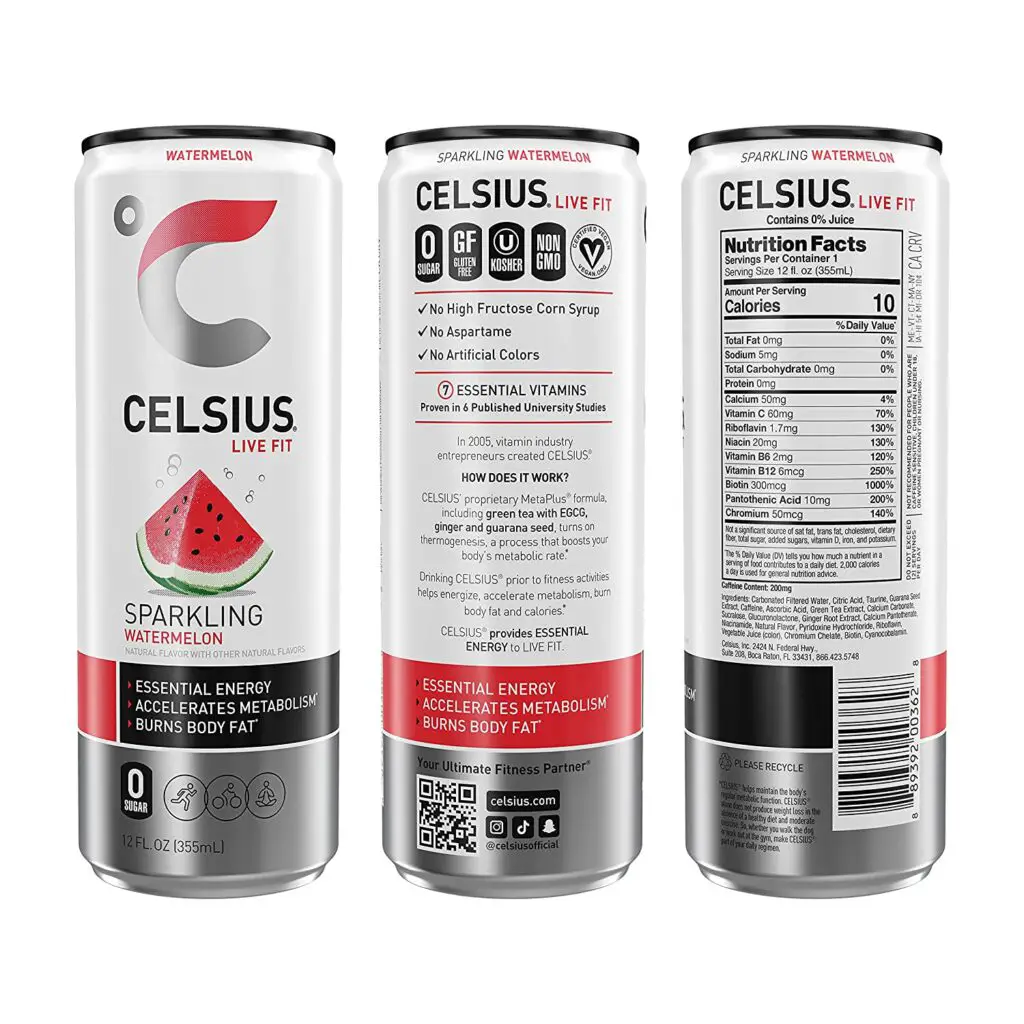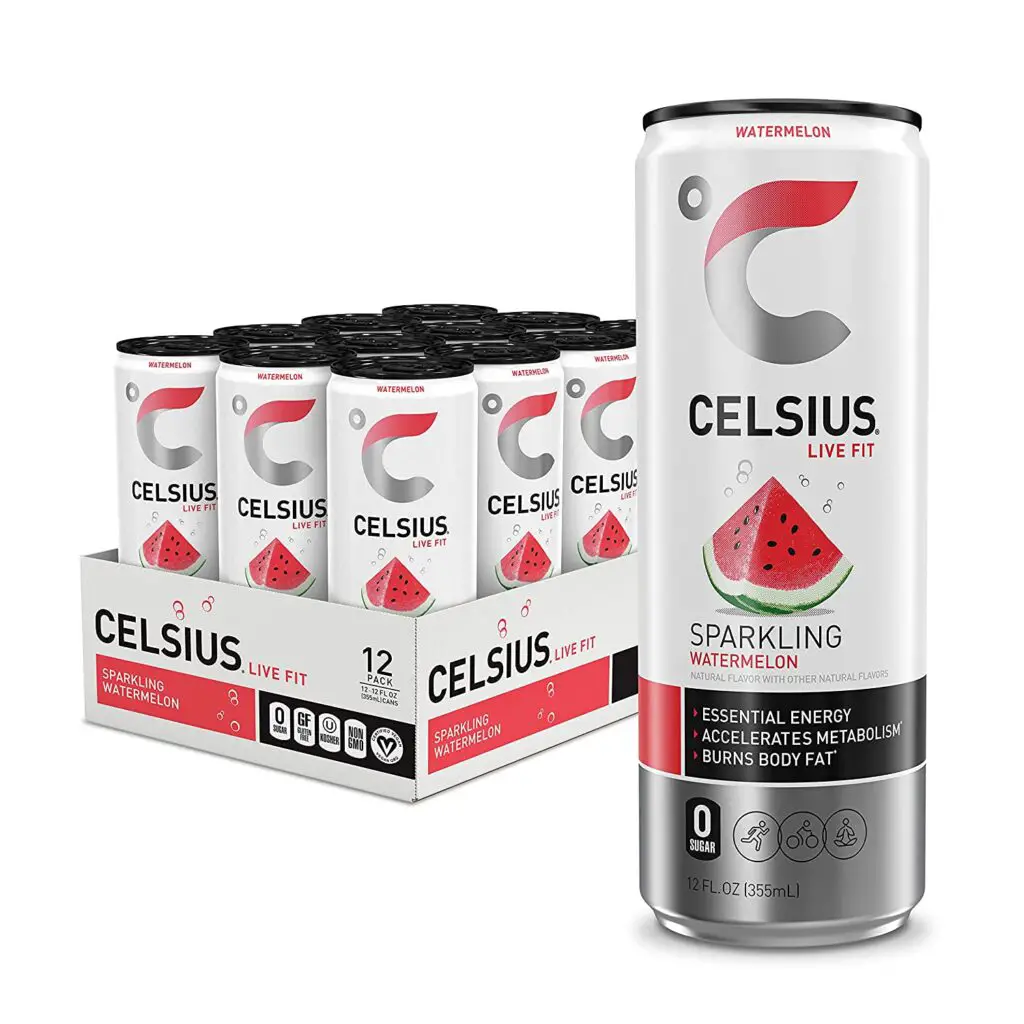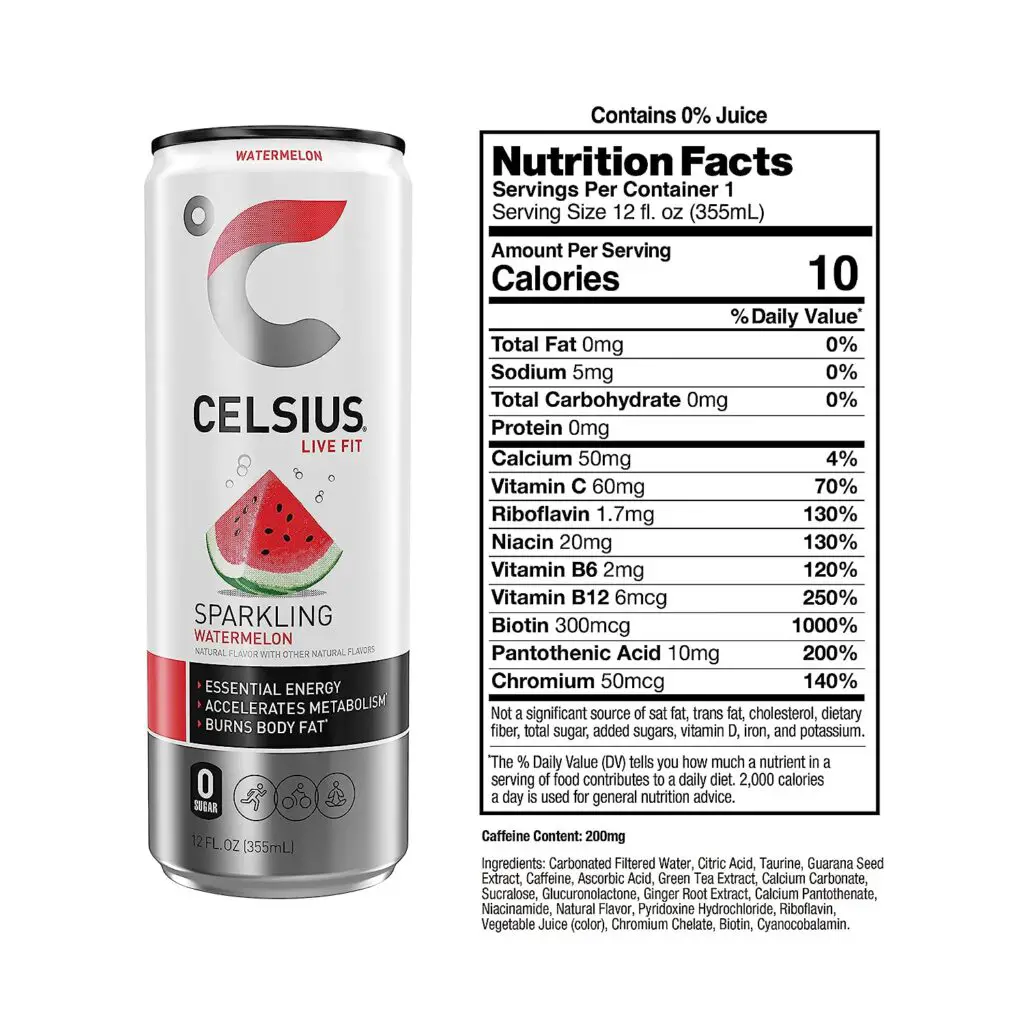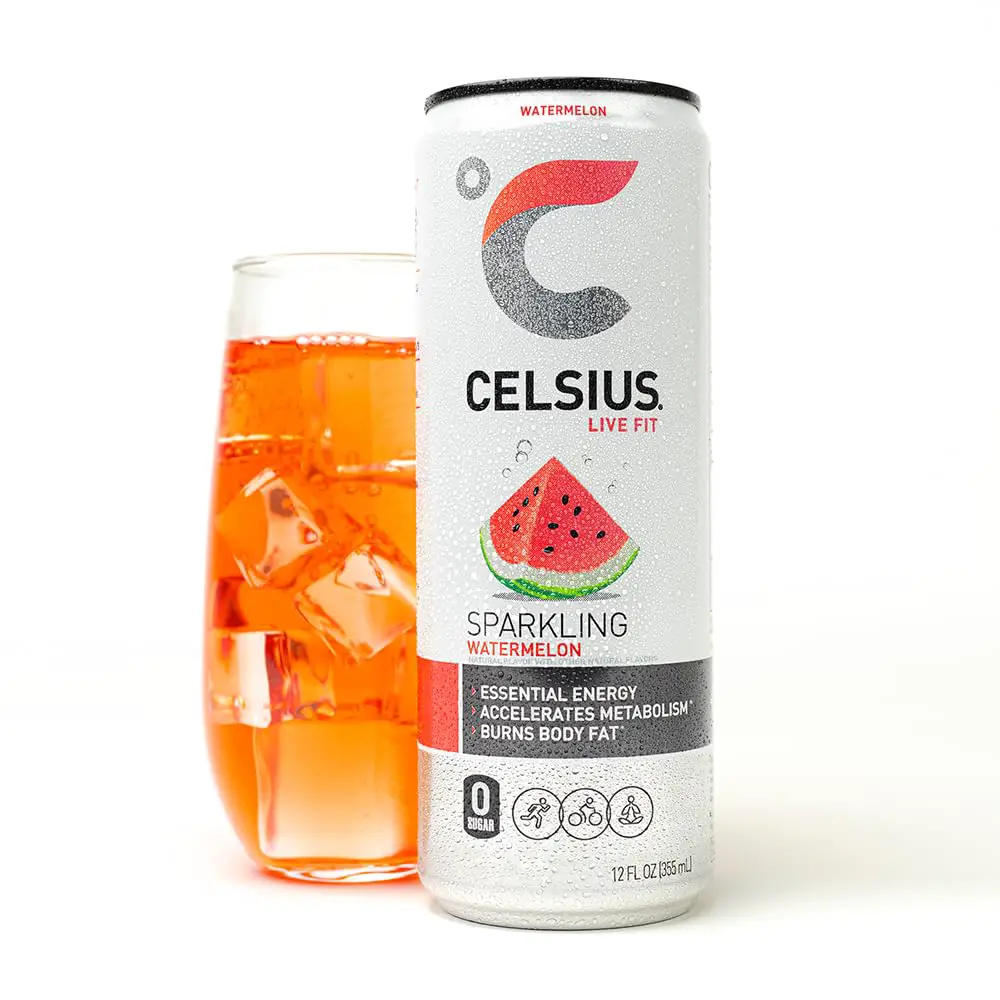Celsius energy drinks have become a healthier alternative to traditional energy drinks. Claiming to provide an energy boost, accelerate metabolism, and burn body fat, Celsius has become a go-to choice for many individuals seeking an energy boost. However, there are concerns about the potential health risks of consuming these drinks. So, are celsius drinks bad for you?
Overview Of Celsius Energy Drinks

Celsius energy drinks are marketed as functional energy beverages with ingredients that increase energy levels. Some of the key ingredients found in Celsius drinks include:
- Taurine is an amino acid believed to improve energy levels, but no medical studies have shown conclusive evidence of its energy-boosting effects.
- Guarana extract: A natural stimulant that may enhance energy and attention, but its combination with other ingredients like caffeine and taurine could have negative effects.
- Caffeine is a well-studied stimulant known to increase physical and mental energy. Celsius contains 200mg of caffeine, equivalent to around two cups of coffee.
- Glucuronolactone: While some studies suggest that it may increase energy, these studies used doses much higher than what is found in Celsius.
- Inactive ingredients: Celsius also contains inactive ingredients like citric acid, natural flavors, and sucralose, which may raise concerns about potential health effects.
Concerns About Health Risks of Celsius Energy Drinks
Despite marketing claims that Celsius drinks are a healthier energy drink option, there are several concerns about their potential health risks:
- Ingredient combinations: The combination of caffeine, taurine, and glucuronolactone may have negative synergistic effects, potentially contributing to changes in blood pressure and insulin sensitivity.
- Added vitamins and minerals: Celsius contains added vitamins and minerals, but there is limited clinical evidence supporting the need for large doses of these nutrients in individuals without deficiencies.
- Inactive ingredients: Some of the inactive ingredients in Celsius, such as citric acid, natural flavors, and sucralose, have been associated with potential toxicity concerns and inflammatory reactions.
- Lawsuit settlement: Celsius settled a lawsuit claiming the products misleadingly labeled themselves as containing no preservatives, as citric acid, one of the ingredients, can be considered a preservative.
While Celsius drinks may not be actively harmful, it is important to consider the potential risks associated with their ingredients. It is always recommended to consume energy drinks in moderation and consult with a healthcare professional for personalized advice. To learn more about Celsius drinks, you can visit their Wikipedia page.
Ingredients In Celsius Drinks
Celsius drinks contain a combination of active ingredients that are intended to provide energy and increase metabolism. Let’s take a closer look at these ingredients:
Analysis Of Active Ingredients
Caffeine: Celsius drinks contain 200mg of caffeine per 12-ounce can, which is equivalent to about two cups of coffee. Caffeine is a central nervous system stimulant that can increase alertness and improve performance.
Taurine: Taurine is an amino acid that is often found in energy drinks. Limited scientific evidence supports the claim that taurine increases energy levels.
Guarana: Guarana is a plant extract that contains caffeine. It may provide additional stimulation when combined with caffeine, but large doses can be harmful.
Green Tea Extract: Green tea extract is known for its antioxidant properties and potential health benefits. It contains a compound called EGCG, which has been studied for its role in weight management.
Potential Risks And Side Effects
While Celsius drinks can provide an energy boost, it’s important to be aware of potential risks and side effects:
- The high caffeine content in Celsius drinks can cause side effects such as increased heart rate, jitteriness, and difficulty sleeping.
- The combination of caffeine, taurine, and guarana can negatively affect blood pressure and insulin sensitivity.
- Large doses of guarana and green tea extract have been associated with liver injury.
- Drinking Celsius regularly may lead to dependence on caffeine and a tolerance that requires higher doses to achieve the same effect.
It’s important to consume Celsius drinks in moderation and be mindful of your caffeine intake from other sources. If you have any underlying health conditions or are sensitive to caffeine, it is recommended to consult with your healthcare professional before consuming Celsius drinks.
Read more: Energy Drinks vs. Coffee: Differences in Energy Boosting
Health Claims Of Celsius Drinks

Regarding energy drinks, claims are often made about their potential health benefits. Let’s take a closer look at some of the health claims associated with Celsius drinks and whether or not they hold true.
Does Celsius Burn Fat?
One of the claims made by Celsius is that their drinks can help burn fat. The company encourages consumers to “ignite your metabolism” through their products. While the active ingredients found in Celsius, such as caffeine, may provide temporary energy and a slight boost to metabolic rate, there is no concrete evidence to suggest that Celsius drinks directly burn fat.
Does Celsius Boost Metabolism?
Celsius drinks also claim to boost metabolism. Indeed, caffeine can temporarily increase metabolic rate, but the effects are usually modest and short-lived. Additionally, the other ingredients in Celsius drinks, such as taurine and guarana, do not significantly affect metabolism. Therefore, while Celsius drinks may provide a temporary energy boost, their impact on long-term metabolism is likely minimal.
Evidence And Limitations Of Health Claims
It’s important to note that limited scientific evidence supports the specific health claims made by Celsius drinks. While some studies have shown that Celsius’s ingredients can temporarily boost energy and metabolism, the long-term effects and potential benefits for weight loss still need to be determined.
It’s also important to consider the potential risks of consuming energy drinks, such as caffeine sensitivity, increased heart rate, and potential interactions with medications or underlying health conditions. It’s always best to consult with a healthcare professional before incorporating energy drinks into your routine.
For more information on energy drinks, their ingredients, and potential health risks, you can visit the Energy Drink page on Wikipedia.
In conclusion, while Celsius drinks may provide a temporary energy boost and a slight increase in metabolism, their specific claims of fat-burning and long-term health benefits need to be better supported by scientific evidence. It’s important to approach energy drinks cautiously, consider potential risks, and focus on maintaining a balanced and healthy lifestyle.
Lawsuit Over Ingredient Claims
In recent years, Celsius has faced a class action lawsuit that accuses the company of misleading consumers about its drink ingredients. The lawsuit alleges that Celsius misled consumers by claiming to contain real fruit juice in their cans, despite containing a sugar substitute called sucralose. Here are some key highlights of the lawsuit:
- The plaintiffs argue that the pictures of fruit on the cans and zero sugar and low-calorie statements create confusion and misrepresentation.
- Celsius contends that a reasonable consumer would understand that the product is flavored to taste like the fruit depicted on the packaging.
- The ongoing lawsuit and a judge refused to dismiss the case in a recent order.
FDA Approval And Banned Substances
Celsius energy drinks claim to be a healthier alternative to traditional energy drinks. However, it is important to note that the Food and Drug Administration (FDA) does not specifically approve or regulate energy drinks. However, the FDA regulates certain ingredients and limits caffeine content in these beverages. Here are some things to know about Celsius in relation to FDA regulations:
- Celsius contains natural caffeine from green tea extract, which the FDA generally recognizes as safe.
- The company states on its website that its beverages comply with FDA regulations regarding the use of ingredients, labeling, and safety guidelines.
- While Celsius does not contain any banned substances as per the 2021-2022 NCAA regulations, it is necessary to be cautious about consuming any energy drink in excessive amounts.
It is always important to do your own research and consult with a healthcare professional to make informed decisions about consuming any food or beverage.
Caffeine Content In Celsius Drinks

Celsius energy drinks are known for their energy-boosting properties, which can be attributed to their caffeine content. It is important to understand the caffeine levels in Celsius drinks and how they compare to other caffeinated beverages.
Comparison With Other Caffeinated Beverages
Each serving of Celsius energy drink contains approximately 200 milligrams of caffeine. This falls within the moderate range compared to other caffeinated beverages. For example, the average cup of coffee typically contains around 95 milligrams of caffeine. It is important to note that the caffeine content in Celsius drinks may vary between different flavors and varieties.
Potential Risks Of High Caffeine Intake
While moderate caffeine consumption can provide temporary energy and improved focus, it is crucial to be mindful of your overall caffeine intake. Excessive consumption of caffeine can lead to various side effects and potential health risks, including:
- Jitters and increased heart rate: High caffeine intake can cause restlessness, nervousness, and an increased heart rate.
- Sleep disturbances: Consuming too much caffeine, especially later in the day, can interfere with sleep patterns and lead to insomnia.
- Dehydration: Caffeine is a diuretic, which means it can increase urine production and potentially cause dehydration if not balanced with adequate fluid intake.
- Increased risk of certain health conditions: High caffeine intake has been associated with an increased risk of heart disease, high blood pressure, and digestive issues.
It is important to understand your own tolerance to caffeine and consider any pre-existing health conditions or medications that may interact with caffeine. Consulting with a healthcare professional can provide personalized guidance based on your specific circumstances.
While Celsius drinks can provide a temporary energy boost, it is essential to consume them in moderation and be mindful of your overall caffeine intake to maintain a healthy lifestyle.
Rapid Heartbeat And Heart Complications
Drinking Celsius energy drinks can lead to an increase in heart rate due to the high caffeine content. This can result in a rapid heartbeat and palpitations, potentially contributing to heart complications. It’s crucial to be mindful of your caffeine intake and monitor your heart health when consuming energy drinks.
Impact On Brain Development In Adolescents
Celsius energy drinks contain taurine, a substance that is not recommended for consumption in combination with caffeine by adolescents due to potential risks to brain development. If you are under the age of 18, it’s important to talk to a healthcare professional about the potential risks before consuming energy drinks.
Other Potential Side Effects
In addition to the above, other potential side effects can occur with the consumption of Celsius energy drinks, including:
- Insomnia and sleep disturbances due to the high caffeine content.
- Anxiety and restlessness.
- Dehydration, especially if consumed in excess.
- Digestive issues such as stomach discomfort or upset.
- Headaches and migraines, particularly if you are sensitive to caffeine.
It’s important to listen to your body and pay attention to any adverse reactions or discomfort that may occur after consuming energy drinks. If you experience any concerning symptoms, it is recommended to consult with a healthcare professional.
As with any dietary supplement or beverage, moderation is key. It’s crucial to consume Celsius energy drinks in moderation and be aware of the potential risks associated with their high caffeine content and other ingredients. Prioritizing a balanced, varied diet and staying hydrated with water should always be the foundation of maintaining good health.
Safety Recommendations And Moderation

While Celsius drinks can provide an energy boost, it is important to consume them in moderation and be aware of certain safety recommendations. Here are some guidelines for consuming Celsius drinks:
Guidelines For Consuming Celsius Drinks
- Consume Celsius drinks in moderation. Limiting your intake to one can per day is recommended to avoid excessive caffeine consumption.
- Be mindful of your caffeine intake from other sources, such as coffee, tea, or other caffeinated beverages, to avoid exceeding the recommended daily limit.
- Stay hydrated by drinking plenty of water throughout the day, as energy drinks can sometimes lead to dehydration.
Recommendations For Specific Populations (pregnant Women, Teenagers, Etc.)
- Pregnant women should avoid consuming Celsius drinks, as they contain caffeine and other stimulants that may adversely affect the developing fetus.
- Teenagers should also avoid excessive consumption of energy drinks, including Celsius, as their developing bodies may be more sensitive to the effects of caffeine and other stimulants.
- Individuals with underlying health conditions, such as heart problems or high blood pressure, should consult their healthcare provider before consuming Celsius or other energy drinks.
It is important to note that individual sensitivities to caffeine and other stimulants may vary, so it is always best to listen to your body and monitor your feelings after consuming energy drinks. Experience any adverse effects, such as increased heart rate, jitters, or difficulty sleeping. It may indicate limiting your consumption or consulting a healthcare professional.
For more information on energy drinks and their potential health effects, refer to the Energy Drink Wikipedia page.
Remember, moderation is key when it comes to consuming energy drinks like Celsius. By following these safety recommendations and being mindful of your caffeine intake, you can enjoy Celsius drinks as part of a balanced and healthy lifestyle.
Conclusion
After a thorough analysis of the ingredients and health implications of Celsius drinks, it can be concluded that they are not necessarily “bad” for you. Still, they should be consumed in moderation and with an informed choice. Here are the key takeaways:
- Effectiveness: Celsius drinks contain active ingredients such as caffeine, taurine, and guarana extract, which are known to boost energy. However, the effectiveness may vary from person to person, and it is important to assess your own tolerance and sensitivity to these ingredients.
- Added vitamins and minerals: While Celsius drinks claim to provide essential vitamins and minerals, the added amounts may only significantly contribute to overall health and energy if you have a deficiency. Maintaining a balanced diet and relying on whole foods as the primary source of nutrients is important.
- Questionable additives: Celsius drinks contain additives like citric acid and natural flavors, which may have potential health risks. These ingredients have been associated with inflammatory reactions and negative changes to insulin levels. It is advisable to be aware of these additives and make an informed choice.
- Comparison to other energy drinks: Celsius drinks are generally considered healthier than traditional energy drinks like Red Bull and Monster due to their lower sugar content, absence of artificial flavors, and artificial colors. However, it is important to note that they still contain stimulatory ingredients that should be consumed responsibly.
Final Thoughts On Moderation And Informed Choice
While Celsius drinks may provide a temporary energy boost, it is crucial to consume them in moderation and make informed choices about your overall health and lifestyle. Here are some key points to consider:
- Moderation: It is recommended to limit your caffeine intake to no more than 400 mg per day, which includes all sources like coffee, tea, and other caffeinated beverages. Consuming Celsius drinks within this limit can help avoid potential side effects and excessive caffeine consumption.
- Diverse energy sources: While Celsius drinks can be a convenient option for a quick pick-me-up, it is important to rely on a diverse range of energy sources, including adequate sleep, regular physical activity, and a balanced diet, to maintain overall energy levels and well-being.
- Individual considerations: Everyone’s body reacts differently to ingredients; it is important to understand your tolerance and sensitivity. If you have any underlying health conditions or concerns, it is recommended to consult with a healthcare professional before consuming energy drinks.
In conclusion, Celsius drinks can provide a temporary burst of energy, but they should be consumed in moderation and as part of a well-rounded approach to energy management. Being aware of the ingredients and making informed choices can help ensure a healthy and balanced lifestyle.

James Robinson loves coffee and blogging all about coffee. His blog is full of informative posts about the best ways to enjoy coffee and the many different types of coffee out there. He also shares recipes for delicious coffee-based dishes, and his followers can always count on him to offer tips on how to improve their coffee-making skills.

